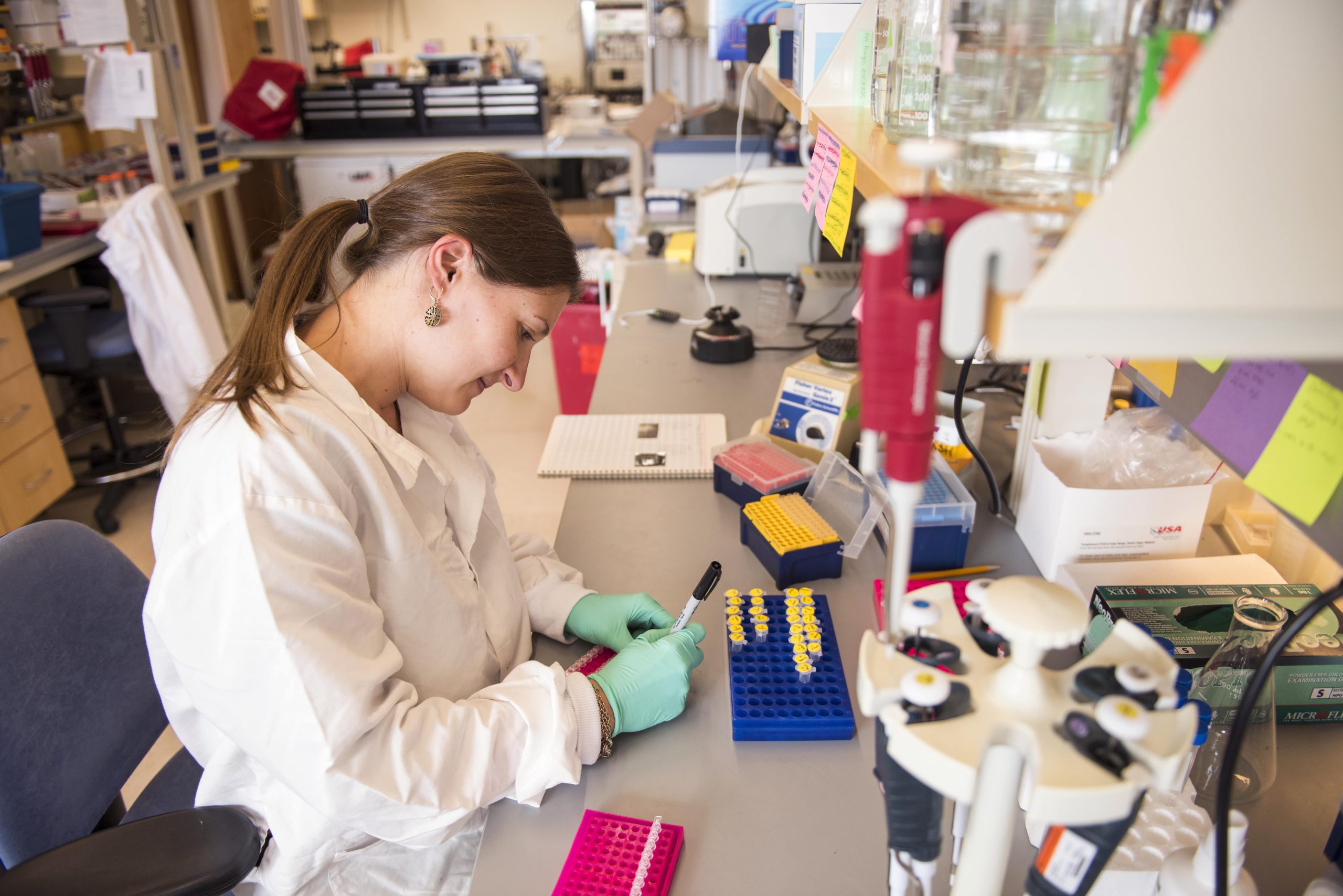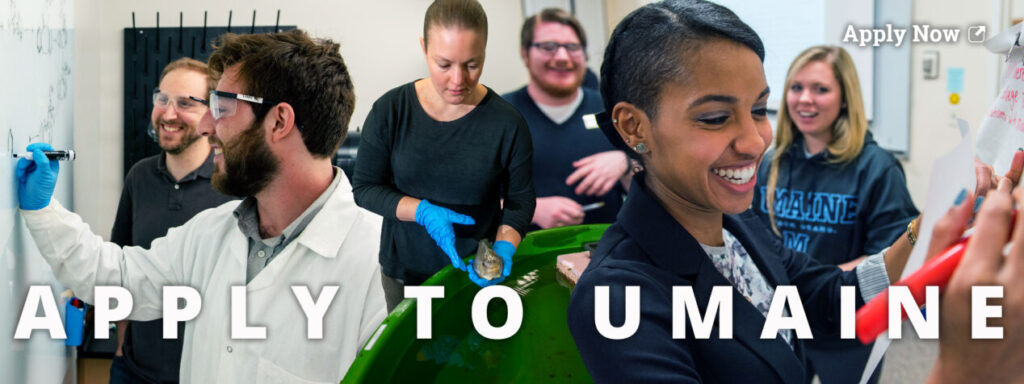GSBSE @ JAX
A GSBSE admission track with first year rotations at the Jackson Laboratory

Overview
GSBSE @ JAX is an admissions track into the UMaine GSBSE’s Ph.D. in Biomedical Science that preserves GSBSE’s hallmark first year laboratory rotations within laboratories at The Jackson Laboratory, allowing students in the track to more deeply explore the research in a range of labs and develop their academic networks before committing to a home laboratory for the duration of the program.
For more information about Cooperative Ph.D. Programs at JAX, please visit: https://www.jax.org/education-and-learning/pre-and-postdoctoral-program/phd-programs
For more information about JAX, please visit: https://www.jax.org/
JAX Benefits
Earning your Ph.D. while training at JAX provides doctoral students access to:
- Training and mentoring by dedicated, world-class faculty
- Unparalleled access to state-of-the-art mouse resources
- Technical expertise of JAX’s comprehensive scientific services
- JAX’s exceptional Courses & Conferences including The Whole Scientist integrated career development program
- Administrative support and guidance from our Predoctoral & Postdoctoral Education Program
- Academic research environment within a renowned, nonprofit institution
- A collegial and collaborative community of fellow trainees
See a list of GSBSE affiliated faculty, students, and Alumni at JAX: https://gsbse.umaine.edu/people/location/the-jackson-laboratory/
JAX Student Community
Doctoral students at JAX are part of a robust community of trainees from across the country and around the globe. Our Director of Predoctoral & Postdoctoral Education along with JAX Genomic Education coordinates regular professional development workshops and learning opportunities, check-ins each semester, and weekly office hours. As members of the trainee community, doctoral students participate in JAX-wide events, including a number of interest groups that organize activities outside the lab. Bar Harbor, Maine, and Farmington, Connecticut offer unique environments for recreation and entertainment.

JAX PhD Student Highlight:
Arad Bustan, Biomedical Science Ph.D. candidate
Hometown: Mashhad, Iran
Undergrad Institution: Ferdowsi University of Mashhad (FUM), Cellular and Molecular Biology
MSc Institution: Mashhad University of Medical Sciences (MUMS), Medical Biotechnology
Q: Can you tell us about your research focus?
I am interested in finding a gene that has not been discovered in a mouse strain called A/WySn. Diana Juriloff and her colleagues discovered that two loci are associated with cleft lip and palate (CL/P) in the A/WySn strain. She found that the first gene located in the clf1 locus is a specific transposable element that disrupts the expression of a critical developmental gene. Transposable elements are a type of jumping genetic elements that can potentially damage the genome by insertion into a functional gene and disable the expression of the gene, or indirectly can cause aberrant expression of linked genes.

Surprisingly, when we cross the A/WySn strain to a wild-type mouse(C57BL/6J), we observe that although the offspring carry the transposable element mutation, none of them exhibit the disease phenotype. It was determined that the second locus of the gene, called clf2, modifies the disruptive effects of the transposable element. However, we do not know which specific gene regulates clf1. In Dr. Baker’s lab at JAX, I am leveraging mouse embryonic stem cell models to address this 20-year-old question.
Q: What do you appreciate the most about being a PhD student at JAX or in GSBSE?
I value the supportive nature of the GSBSE program. GSBSE is a great opportunity to get familiar with a broad range of science and network with different sites and institutions. At JAX, living inside Acadia National Park helps me appreciate nature and delve deeper into my research. Staff at JAX are incredibly collaborative and helpful. Having the state-of-the-art facilities and next-generation sequencing helps me to have more freedom to do my research.
It’s incredibly enriching to be part of a community where I not only interact regularly with my GSBSE classmates but also connect with Tufts students right here in Bar Harbor. JAX fosters a strong sense of academic community across its campuses, and I especially value the trainee talks that bring together students and postdoctoral researchers from different locations. These sessions provide a fantastic opportunity to share research, gain diverse perspectives, and build meaningful professional relationships.
Q: What advice would you give to your younger self or any aspiring PhD students who are trying to decide between graduate programs?
Many of us are drawn to biology out of a deep curiosity. Don’t limit yourself to just one area. Exploring different research fields can expand your knowledge and help you discover what truly excites you. Your PhD focus doesn’t have to align with your undergraduate project. In my opinion, research fit matters more than prestige. When considering lab rotations, think carefully about the mentorship style that suits you best. A supportive and communicative mentor can make a huge difference in your experience and success. Never hesitate to ask questions, whether it’s about research, coursework, or navigating grad school life. Your peers and faculty are there to support you, and most people are genuinely happy to help. Protect Your Well-being. Burnout is real. Make time for hobbies and activities outside of your research. Your project is important, but it’s not your whole life.
Ready to Launch Your Future in Biomedical Innovation?
Apply now to the Ph.D. Programs in Biomedical Science or Biomedical Engineering at the University of Maine. As a GSBSE student, you’ll collaborate with world-class researchers not only at UMaine but also at our renowned partner institutions — The Jackson Laboratory, the MaineHealth Institute for Research, the MDI Biological Laboratory, and the University of New England. This is your opportunity to join a vibrant, multi-institutional research community driving scientific discovery and innovation across Maine and beyond. The next deadline to apply is December 1, 2025 for Fall 2026 admission.
Questions?
Email gsbse@maine.edu.
